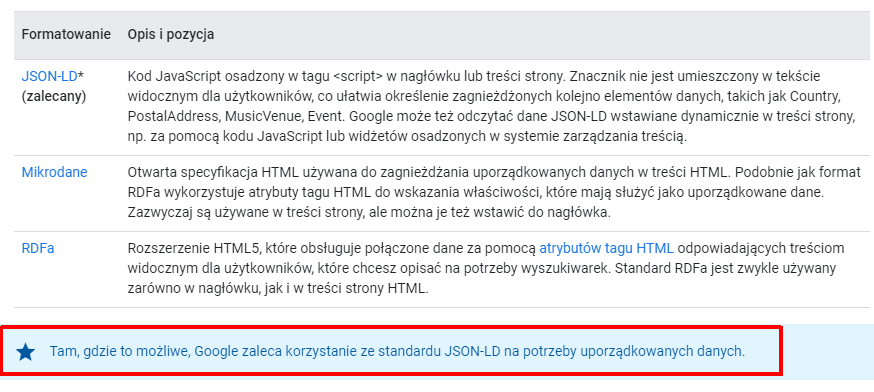It is a truism to say that SEO is evolving and developing at a rapid pace. There are trends, programming languages and skills that are definitely worth learning. Because either they are forward-looking and likely to establish themselves permanently as desirable in the industry, or they have been around long enough that it would be worthwhile to finally take the plunge into learning them.
The title of this post is not accurate for two reasons. These skills are neither necessary to stand out (so you don’t “need” them at all), nor does having them guarantee success. These are just interesting examples of programming languages and skills that don’t always and don’t seem obvious to everyone.
Alright, let’s start with what you should know, then we’ll move on to skills that are perhaps a bit more ambitious.
Spis treści
Basic skills in SEO
HTML5
The obvious is frighteningly not obvious in the reality of many agencies. SEO Juniors and even Seniors often don’t have the faintest idea about even the basics of HTML, except maybe – necessarily – the element <a>.
I wrote a few words about what to use in HTML #5 in terms of semantics and text structuring here. I’m not going to write more about HTML, because not knowing it is a crime 😉
JavaScript basics (and maybe even jQuery)
Let’s stipulate one thing: it’s impossible to do a good job in SEO in 2020 and not have at least a lick of any knowledge of JavaScript. Without at least basic knowledge, you don’t know what is happening on your client’s site and why something is happening. You are like a blind man guiding another blind man across the street as part of a lavish subscription fee.
JSON-LD
Although it has JavaScript in its name (JavaScript Object Notation for Linked Data), it is “linguistically” independent. Anyway, to write something in it, you don’t actually need to know any programming language. Just look at the construction of the first better example in the documentation and everything becomes clear.
We can actually slowly forget about the other data formats for the implementation of structured data; both microdata and RDFa do not give us such flexibility, and JSON-LD has even been labeled as a recommended format in Google’s documentation.
CSS
About the possible impact of good CSS code on SEO I am currently preparing an article, which so far loses the battle for time to the first part of Half-life. Anyway, I’ve already written a bit about font-display, for example, which shows how a single line in a CSS sheet can significantly affect a site’s loading time, and thus SEO.
It’s simply a good idea to know CSS; also because it’s then easier to explain to a client who is annoyed that we write all the headings on his site in capital letters, which is against netiquette.
h2 {text-transform: uppercase;}
Analytics
Analytics actually shouldn’t be included here, because I don’t include it among the hard skills. Rather, analytics is the ability to draw conclusions – basic knowledge is all that is needed to draw data alone. But if you feel that you have some shortcomings here, a course or training in, for example, Analytics will certainly help you.
PHP, after all
Although there are developers for whom, in addition to their morning coffee, mocking PHP is a daily ritual, a study from last year says that for 79.1% of the websites we were able to check, the server-side programming language was PHP.
Having even a basic knowledge of this programming language is a highly recommended skill in the reality that WordPress, written in PHP alone, serves 14.7% of the Internet.
Slightly less obvious skils that will make you stand out from the crowd
Python
There’s a fad for Python in the SEO world right now. I don’t program in Python, I don’t know Python – the web is already full of tutorials and information on how to apply it to your SEO work.
The problem is that I have read a lot of articles on the subject, and, yes, I see a lot of uses for this language, especially in terms of data analysis and processing. But I don’t see that much of an advantage here that would suddenly make all SEOs learn an entire language from scratch.
But according to the caveat – I don’t know Python. There is nothing worse than a person who speaks with complete conviction, on a subject about which he has no idea. Therefore, I leave it for your consideration, reporting only that the hype for Python in SEO continues in earnest.
Excel a little more advanced
If you have already discovered the vlookup function in Excel then you are on a great way to achieving your goal. There are still pivot tables, IFs, conditional formatting – basically, the use of Excel (or Google Spreadsheet for smaller files) in SEO is limited only by your imagination.
Working with data in Excel at an advanced level is, in my opinion, invaluable.
WordPress at a very advanced level
60.8% of all CMS-based sites run on WordPress. Knowing WordPress and WooCommerce inside out – as long as you operate such sites on a daily basis, of course – is an extremely useful skill.
Why, when there are plug-ins for everything? Well, this thinking is wrong on many levels. Plug-ins are not for everything, and in most cases they are the living definition of the beautiful English term overkill (form over content in the purist version).
For a long time, for example, when building a site in WordPress, I do not use any SEO plugin.* Knowledge of PHP and WordPress documentation will allow you to do things that for Yoast or All in One SEO are impossible. Anyway, I am preparing an article on this topic as well ;).
*But, of course, on the site where you are staying the plug is – because, as we know, the cobbler walks without shoes 🙂
RegExp
Finding and replacing strings using regular expressions is one of the most scattered, unplanted skills in the SEO world. You never know when it might come in handy – whether in a .htaccess file, in data analysis, scraping, or simply when editing a large file in Notepad++.
XPath
Like regular expressions, XPath is an easily digestible topic and useful at many – often least expected – times.
For example, if, for example, you want to get a map of all your competitor’s structured data to analyze, all you need is knowledge of XPath and some basic crawler.
Apache Directives, robots.txt directives and more
Well, the directives (e.g. redirects) in the .htaccess or robots.txt file are elements that are not particularly complicated to learn, but not particularly important either. Most of them are simple formulas copied from, for example, Stack Overflow.
Nevertheless, it’s good to know what code you paste into the files that determine our site, and in more complicated cases, create the appropriate directives yourself.
HTTP
One of the most ignored elements in SEO is HTTP requests and, most importantly, responses. And not just because of the server response codes.
It’s not some special secret knowledge, but it’s useful to at least know where HTTP requests and responses can be found. Not only to know if the developer made a mistake and redirected the old domain to the new one via 302, or if, on the last day of work, he didn’t play a prank on us and set X-Robots-Tag: noindex.
React and other “new” technologies
This is where, for the non-programmer, the stairs begin. I only program as a self-taught programmer myself, and the React course clearly pointed out my workshop deficiencies. This also applies to other modern technologies, such as. Angular.
So if you are a programmer who absorbs this kind of new technology at lightning speed – great. If you are self-taught, don’t worry either. Familiarity with JavaScript (or TypeScript), the console in Chrome, and a close and intimate acquaintance with a portal called Stack Overflow are enough to analyze a page for SEO purposes. Just be honest and don’t introduce yourself to the client as a “React specialist” if you are not one.
Finger in every pie
In fact, the most valuable skill in SEO is learning quickly and finding information easily.
If the client has Flash elements on the site, tell him that simple animations will do in HTML5. Ultimately, you don’t need to know how to do it, you just need to know that it can be done.
If you want to turn 60 graphical icons into CSS Sprite for a client, you need to grasp the basics of some graphics program. But you don’t have to be a master at it.
It is enough to have basic technological knowledge in many fields. And in fact, you just have to want to learn it. The basis is efficient research and quick information search, and Stack Overflow set as the homepage. And that should be enough to start with.
What technologies, programming languages and other hard skills have I forgotten? Feel free to comment.










